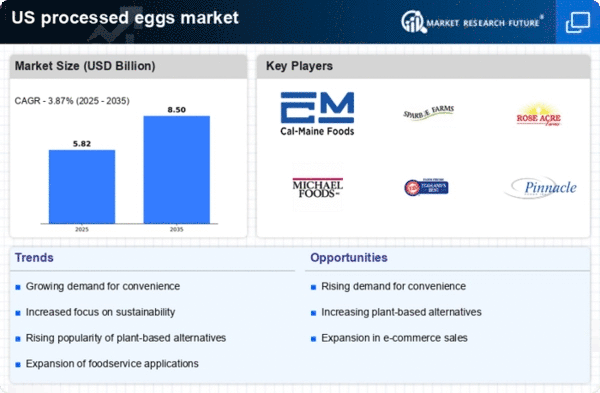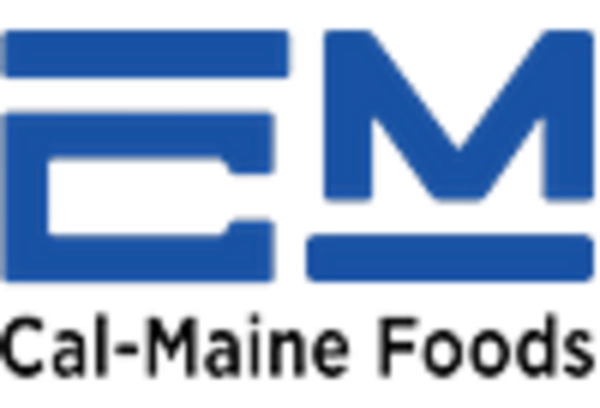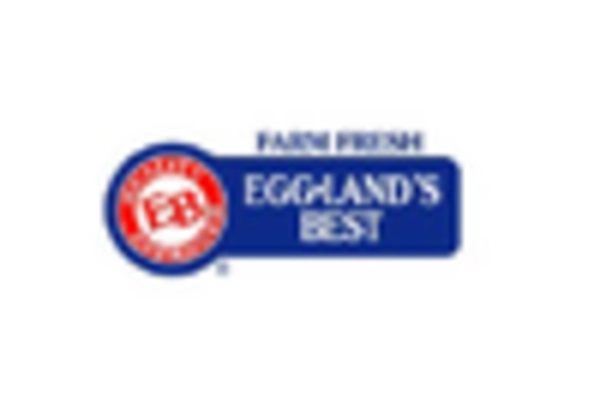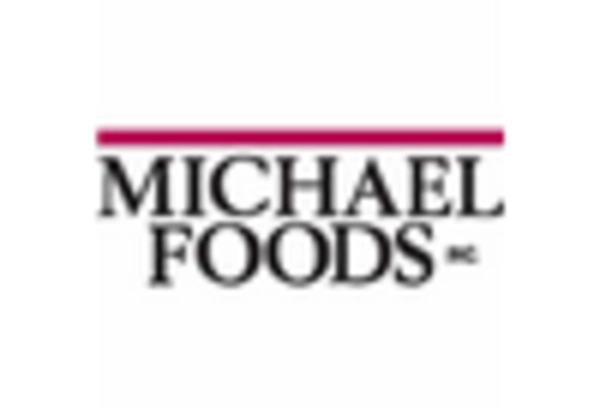Expansion of Food Service Sector
The expansion of the food service sector in the US is anticipated to positively influence the processed eggs market. As restaurants, cafes, and catering services continue to grow, the demand for versatile and convenient ingredients like processed eggs is likely to increase. Processed eggs offer advantages such as longer shelf life and ease of use, making them ideal for food service applications. The processed eggs market may benefit from partnerships with food service providers, enabling the development of tailored products that meet specific culinary needs. Additionally, the rise of meal delivery services and ready-to-eat options could further drive demand for processed egg products. This trend suggests a promising outlook for the processed eggs market as it aligns with the evolving landscape of food consumption.
Growing Adoption of Plant-Based Diets
The increasing popularity of plant-based diets among consumers appears to be influencing the processed eggs market. As more individuals seek alternatives to traditional animal products, the processed eggs market may experience a shift in demand dynamics. This trend could lead to innovations in product offerings, such as egg substitutes that cater to vegan and vegetarian consumers. The processed eggs market may need to adapt by developing new formulations that align with these dietary preferences. Furthermore, the market could see a rise in hybrid products that combine eggs with plant-based ingredients, potentially appealing to a broader audience. This shift may also encourage manufacturers to emphasize the nutritional benefits of eggs, such as their high protein content, to attract health-conscious consumers.
Rising Interest in Protein-Rich Diets
The growing interest in protein-rich diets among consumers is likely to drive demand within the processed eggs market. Eggs are recognized for their high protein content, which aligns with the dietary preferences of fitness enthusiasts and health-conscious individuals. This trend may lead to an increase in the consumption of processed egg products, such as liquid eggs and egg whites, which are often marketed as convenient sources of protein. The processed eggs market could capitalize on this trend by developing targeted marketing strategies that highlight the nutritional benefits of eggs. Furthermore, the market may see a rise in product innovations, such as ready-to-eat meals featuring eggs, catering to busy consumers seeking quick and nutritious options. This focus on protein could significantly impact sales and product development in the processed eggs market.
Increased Focus on Food Safety Regulations
The heightened focus on food safety regulations in the US is expected to impact the processed eggs market significantly. Stricter guidelines and standards for food production may compel manufacturers to enhance their quality control measures. This could lead to increased investments in processing technologies and facilities to ensure compliance with safety regulations. The processed eggs market may see a shift towards more transparent labeling and traceability, as consumers become more aware of food safety issues. Companies that prioritize food safety may gain a competitive edge, potentially influencing consumer purchasing decisions. As a result, the processed eggs market could experience growth driven by a commitment to quality and safety, aligning with consumer expectations.
Technological Advancements in Food Processing
Technological innovations in food processing are likely to play a crucial role in shaping the processed eggs market. Advances in pasteurization, drying, and packaging technologies may enhance product safety and shelf life, thereby increasing consumer confidence. For instance, the introduction of high-efficiency spray drying techniques could improve the quality of powdered eggs, making them more appealing to food manufacturers. The processed eggs market may benefit from these advancements by offering products that meet the evolving needs of both consumers and food service providers. Additionally, automation in production processes could lead to cost reductions, allowing companies to offer competitive pricing. As a result, the processed eggs market may witness an increase in demand from various sectors, including food service and retail.

















